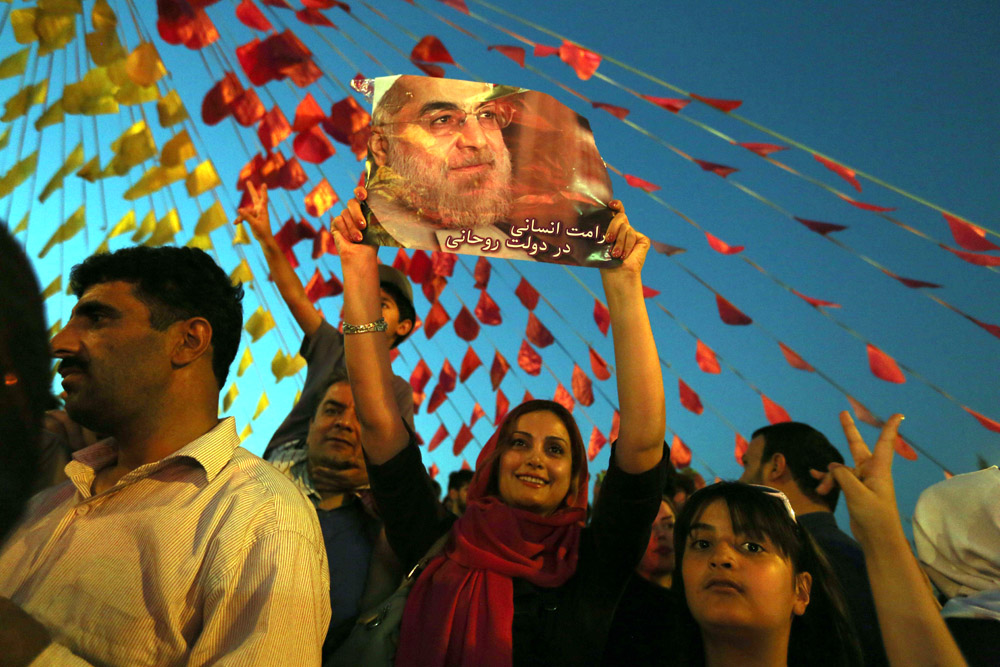Australia/Israel Review
A small “stinging blow” from Iran’s electorate
Jun 26, 2013 | Abbas Milani

Abbas Milani
Patient resilience has long been a characteristic of the Iranian people. In times of adversity – and the increasing authoritarianism of Ayatollah Ali Khamenei and his Revolutionary Guards allies, combined with the corrupt and inefficient populism of outgoing President Mahmoud Ahmadinejad and his band of brothers, has certainly been one such time – the Iranians wait. And usually, instead of challenging the foe head-on, they try to deliver a stinging blow using the limited tools that adverse times allow them. President-elect Hassan Rouhani is the latest, rather unlikely tool used to sting the Islamic regime.
There was no doubt that candidates Saeed Jalili, Ali Akbar Velayati, and Haddad Adel were Khamenei’s preferred choices. But tensions within the conservative camp resulted in the electorate’s failure to cohere around a common candidate. Moreover, tensions between Ahmadinejad and Khamenei – which had been brewing for the last four years – meant that it was virtually impossible to “engineer” Friday’s election, as hoped. In a couple of timely leaks to websites close to him, Ahmadinejad served notice that he would not help engineer results.
Realising the unusual alignment of forces, the voting public chose to use Hassan Rouhani to deliver a clear message to the regime. Rouhani, too, realised the importance of this alignment and clearly tried to distance himself from the status quo. “I am”, he said, “against barrack politics and against empty slogans. We should respect people’s democratic rights at home and attempt accommodation internationally.”
Ultimately, the election became a referendum between the regime’s politics of intransigence, rhetorical piety, and “resistance,” and a new posture of rationalism, accommodation, and democracy. The people clearly rejected the status quo, hoping for a new, more rational and democratic politics. Voting for Rouhani was the people’s only way to deliver that message.
Rouhani has been near the centre of Iranian politics for more than three decades. He was an early protégé of former President Ali Akbar Hashemi Rafsanjani, one of the founding fathers of the revolution, and was eventually put in charge of Iran’s nuclear negotiating team during the Mohammad Khatami presidency (1997-2005). When Ahmadinejad became president, Rouhani was accused of accommodating Western demands.
In a best-selling memoir, published last year, he offered his version of the nuclear negotiations and accused Ahmadinejad and his supporters of torpedoing every agreement he reached with the West. In spite of these attacks, Rouhani remained a member of the Supreme National Security Council, and what role he played in the suppression of student demonstrations was a heated subject during his campaign. His candidacy for the presidency only gained momentum when the Reformists and the Rafsanjani camp supported him as the perceived anti-Khamenei candidate.
Rouhani proved to be a savvy campaigner, distancing himself further and further from the regime. He promised to secure the release of opposition figures. He soon emerged as the favourite of a coalition of anti-regime forces.
But as the eight-year presidency of the reformist Khatami showed, what the people hope to achieve by electing tools to sting the regime – like Rouhani and Khatami – is not necessarily what they get. It is as easy to exaggerate the significance of the election results as it is to misconstrue their implications. In spite of the tactical rebuke he received from the people, Khamenei and his conservative allies still have many weapons at their disposal.
Their control of the judiciary, the legislature, the media, the Revolutionary Guards, the Basij, and their access to licit and illicit revenues, their attempt to preserve the Assad regime in Syria, and their hegemony over the nuclear program means they can contain, control, and, if need be, brutally annul any effort by Rouhani and his reformist and pragmatist allies to change Iran’s domestic or international policies.
No one knows what the future will hold. Has the regime actually learned a lesson about the bankruptcy of its politics, and will it allow Rouhani to introduce changes? Or will the regime merely accept the result of this referendum, then return to its old policies? Anything other than cautious optimism about last week’s results could beget either tomorrow’s despair or inadvertent complicity in the current regime’s machinations. After all, maintaining the status quo while giving the appearance of change has been one of the keys to the regime’s survival strategy.
Dr. Abbas Milani is a visiting professor of Political Science and the director of the Iranian Studies program at Stanford University. His most recent book is The Shah (Palgrave Macmillan, 2011). © New Republic (www.tnr.com), reprinted by permission, all rights reserved.
Tags: Iran






